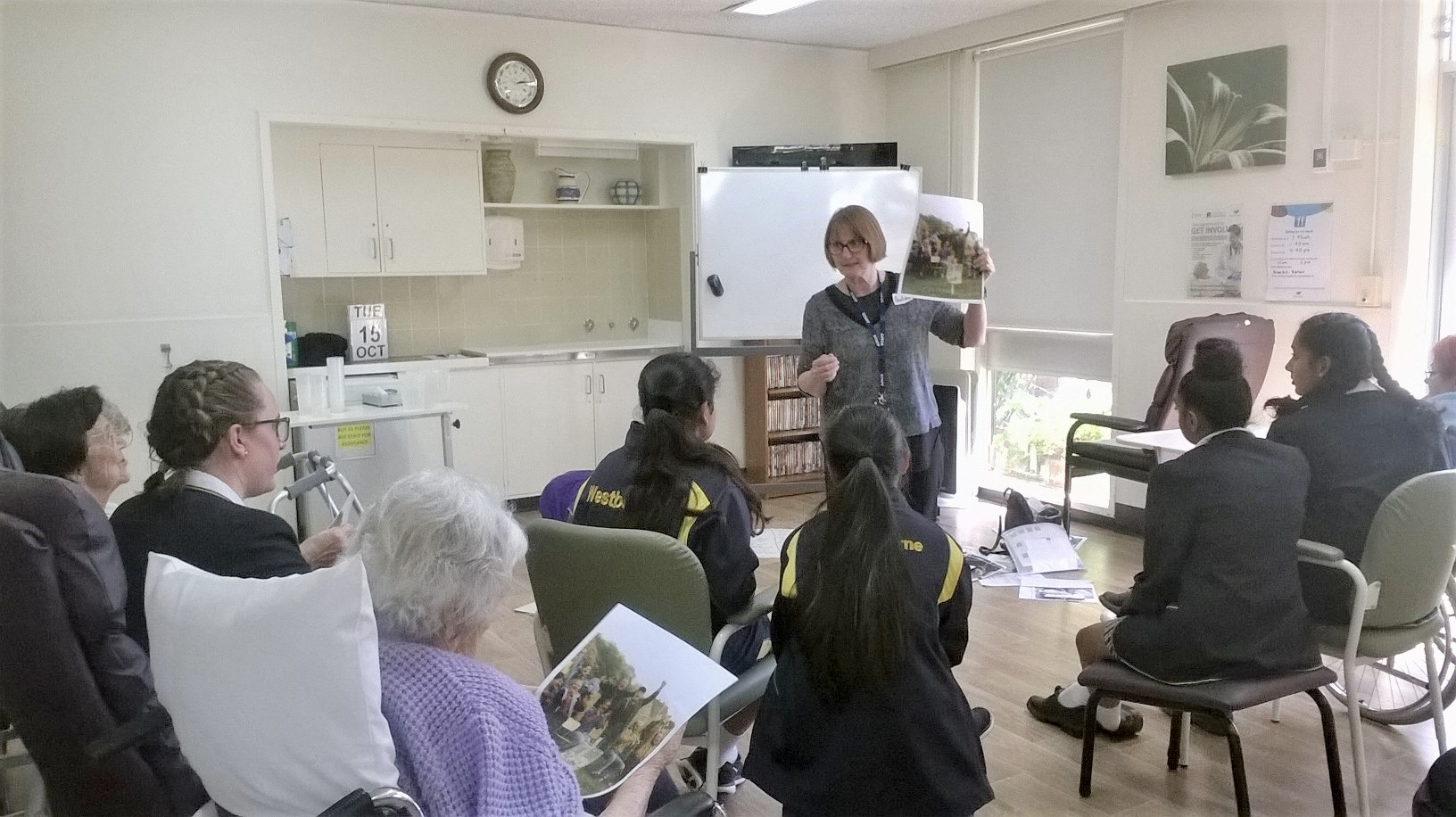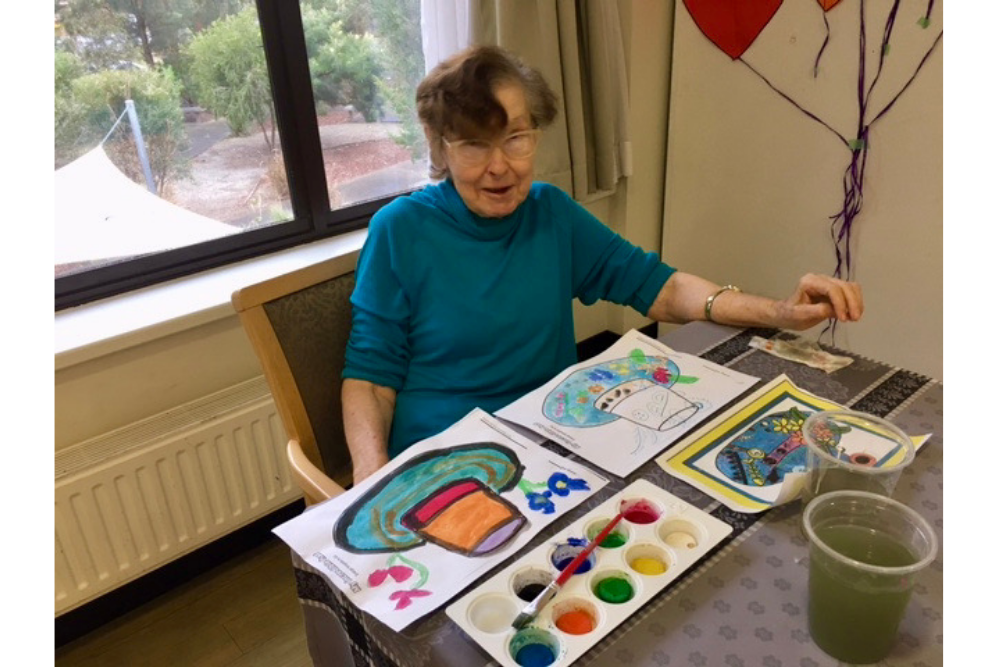In her recent best seller, The Invisible Woman, Caroline Craido Perez claims that ‘most of recorded history is one big gender gap’. When it comes to the lives of the ‘other half’ of humanity she says, ‘there is often nothing but silence.’ This is perhaps never more evident than in the final years of our lives when some of us are residents in aged care homes.
Let me introduce Melva (pictured), a stylish, eighty-five-year-old, who lives in an aged care home in Melbourne. Never married and no children, painting, dancing, and singing are her passions. Yet few people around her would know this. For Melva, as for other residents, many things just don’t add up. In her residential life, there are no opportunities for her to paint. ‘I’m not allowed to paint,’ she says, ‘everyone is too busy.’ She never dances and the only singing she does is when the music therapist comes once a month. Even then, songs sung, as they all gather in the sitting area, are usually chosen only from the therapist’s list and are not the tunes Melva loves from her Saturday night dancing days, whirling to Doris Day and Billie Holiday. ‘We danced every Saturday night,’ she says, bursting into song.
Like many women in residential aged care, Melva has a life of leisure, yet all material means for her to enjoy this leisure have been removed. Melva’s plea to do a little painting is a case in point. At a time when her life can accommodate some boundlessness, Melva’s days are more tightly bound than at any other time. And Melva’s experience is not an exception, it is the rule.
Approximately two out of three aged care residents are women, yet their voices are rarely heard, apart from in minimal day-to-day conversations with care workers and in family visits. And of course, if we happen to be living with dementia –and considerably more women than men are diagnosed each year- there are even fewer opportunities to express and share our personhood.
The care workers, who inadvertently hold the ropes around Melva and her fellow residents, are the nicest of folk. Their work shapes and maintains the routines of Melva’s life, smiling as they go about clearly defined, tasks: making beds, issuing medicine, supervising toileting and dressing, arranging meals, and ensuring residents move safely from one space to another. There is no time or capacity for cultivating the conditions Melva needs for her painting, dancing and singing. No time to ask, ‘Melva would you like to paint now? ‘And then say, ‘I will set out your equipment for you and clear it up when you are finished.’ In fact, by and large, there is no time for Melva’s care workers to provide the individual and social interactions she needs and desires.
This is what Simone de Beauvoir has called the ‘poverty of old age’; it means that life is reduced, lived close to illness and infirmary, with voices that are soft at best, non-existent at worst, and in rooms where televisions are always on – every hour, every day.
Yet, research in the fields of cultural gerontology, heath humanities and creative care all report that there are other ways of living our final years. Projects and programs across the world show that the impoverishment of old age can be replaced with riotous rollicking laughter in residential sitting rooms, and with scenes of residents making a mess, listening to, and reading poetry out loud, singing, painting, and showing off old-time dance steps. And, in rooms where televisions are turned off!
Indeed, a quiet(ish) revolution is creeping into aged care systems, gathering sufficient momentum for us to hope, as Professor Anne Basting, has stated, ‘that creative care might be poured like water into care systems … and change the way we understand and deliver care.

Pauline Griffiths, educator, writer, and musician, is completing her second PhD in the Centre for Creative and Cultural Research at the University of Canberra.
Creative Practitioners are leading this revolution. A form of Allied Health, they cultivate the conditions needed in order for aged care residents to be heard, and recognised as owners of their own social spaces. Creative practitioners work like teachers, except they are teachers without the burden of assessment and reporting. Indeed, qualified teachers make excellent creative practitioners.
Around a table in a sitting room, a creative practitioner lays out materials: pictures, craft supplies, poetry, recipes, and a musical instrument or two, to cultivate conversations, and spontaneous singing among residents. The aim is to have fun, come together, make a mess, tell personal stories, read some poetry. An hour later, at the end of a noisy workshop, there is a veritable gallery of story snippets, poetry fragments, painted pictures, spontaneous singing, and most importantly satisfied happy residents.
My research at the University of Canberra, has led to a three-part toolkit for use by creative practitioners, care workers and family members of people living in aged care homes: the kit shows how to cultivate the conditions for personal creative writing; lead creative workshops; and deliver intergenerational imaginative storytelling sessions.
Creative care programs not only give elderly people a voice, they also break the stranglehold of residential aged care life. It’s a fact that as we grow old, our imagination is the last thing we lose; when memory goes, we still have imagination. In this way, our imaginations can become the main purpose for living and give meaning to our lives.
So, if we put our ears to the door of a good aged good care residences, we’ll hear voices of elderly women and men – chatting, laughing, telling stories, even weeping a little here and there, engaging in impromptu storytelling and reminiscing; inspired by picture prompts and objects that invoke touch sound sight and smell. And while Creative Care programs are not yet fully trumpeted fanfares in aged care residential homes, they nevertheless are coming to be appreciated as essential social forums in which Elders can reclaim their voices. As Melva says, in the middle of a workshop, paintbrush in hand, ‘We should do this every day!’
- Pauline Griffiths is an educator, writer, and musician, completing her second PhD in the Centre for Creative and Cultural Research at the University of Canberra. Her work in cultural gerontology and health humanities has led to the development of a toolkit for creative care programs in aged care residences.
Pauline Griffiths is an educator, writer, and musician, completing her second PhD in the Centre for Creative and Cultural Research at the University of Canberra. Her work in cultural gerontology and health humanities has led to the development of a toolkit for creative care programs in aged care residences.





